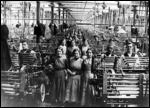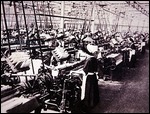For better or for worse, I am from a small town in the North West of England called Burnley.
During the Industrial Revolution, it was one of the largest producers of cotton in the world, a bustling centre of commerce and engineering
. In 1912, 8 billion yards of cotton were produced in Britain, mainly out of the hundreds of factories in and around my hometown. However, by 1939, 800 mills had closed and 345,000 workers had left the industry. The reason for this sudden, devastating and crippling blow to the British cotton empire? You may be surprised to learn that the answer lies in part with the Japanese, and that fateful afternoon in Sarajevo on June 28th, 1914.
To condense a really complicated historical chain of events into one sentence for those unaware of what I am referencing, this is the day that the Archduke Franz Ferdinand was assassinated, thereby indirectly causing the outbreak of World War 1.
Again, to skip through several of the most tumultuous and bloody years of human history for the sake of brevity, in the latter years of the conflict Britain turned to Japan to fill much needed orders of wartime material, including - you guessed it - cotton
. Total exports quadrupled in the country between 1913 and 1918, transforming Japan from a debtor to a creditor nation for the first time in its history.
The first world war unquestionably signalled the beginning of the end for the British cotton monopoly. The subsequent economic boom in Japan in the inter-war years had a snowball effect on cotton production, and in no time at all the Japanese had far outstripped their British counterparts in the industry. In 1933, 24-hour manufacture had been introduced, the purchase price of cotton was at an all time low and Japan was the worlds biggest exporter.
Meanwhile in Burnley, Lancashire, factories were closing. Unable to compete at the price and with large workforces without orders to fill, owners were upping sticks and moving to pastures, and industries, new. The factory workers were soon to follow, seeing a mass exodus of people from the North West and into the mining communities of the North East and Midlands
.
All too quickly, all that remained of a once-proud, global industry on the skylines of dozens of northern towns were the derelict factories and mills. Today they still stand, as empty now as in 1933, only with broken windows and graffiti scrawled across their walls. These towns have struggled ever since. Unemployment is high, standards of healthcare and education are low and there is little to no cause for optimism in the near future for their residents.
At this point I bet you are wondering what the relevance of this slightly long-winded history lesson (as if there is another type!) to my travel blog is. Bear with, we are almost there.
I have spent a good couple of months in Japan now, and my day in Atami, a seaside resort town on the northern end of the Izu Peninsula, epitomized what I have come to love about the country and its people. I have spent a long time making comparisons about where I am now and where I am from
. As you might imagine, they are overwhelmingly in favour of my current environment. From respect for others to religious ideals, from cleanliness to cultural pride, from friendliness to a feeling of safety and complete contentedness... in each instance I truly believe that the Japanese have got it right. Consequently, it becomes harder each day to remember what there is to love about Britain.
But there are reasons to love Britain. No other nation can say, as we can, that we stood alone against the regimes of evil (in which I include the Japanese) and fought to preserve freedom and humanity in the face of overwhelming odds. No other nation in the world re-defines itself again and again as we do, as a result of believing that anyone can come to our country and work hard for a better life. In no other country in the world would Jedward have been able to forge successful careers as musicians.
When I started this, I wanted to write about our day in the sun. About beach balls and ice creams and late-night fireworks. But it doesn't seem all that important now and, I guess the start of this blog was a little misleading. Being from a place like Burnley it isn't so much about for better or worse, rather, for better and worse. We are shaped from the places we come from, from the history and the people we are surrounded by. I love travelling, and I love living and working in Japan. However, a part of me knows that I could stay here a hundred years and still call the abandoned factories, winding canals and cobbled streets of North West England my home.
Note: I don't own or take credit for any of these photos.
In defence of Britain, my home.
Friday, July 26, 2013
 Atami, Chubu, Japan
Atami, Chubu, Japan
Other Entries

 Atami, Chubu, Japan
Atami, Chubu, Japan




2025-05-23